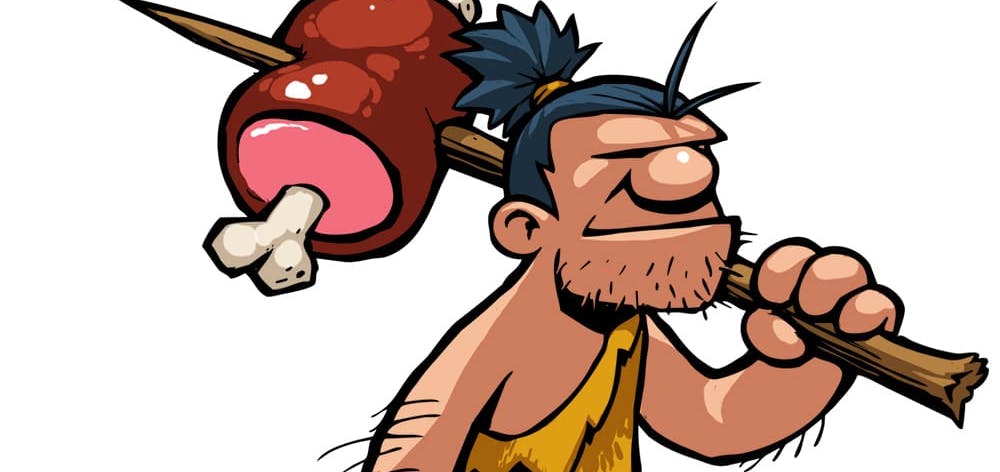In many aspects of life, you will be told that to look forward, you must first look back. This can give you a greater understanding of where you are now, how you got there, and what you can do to move on. Understanding something when you try to improve/change is a huge part of finding success. It’s a valuable asset that should be used. Yet, in the common pursuit of losing body fat, it’s often never utilised. Knowing why we store fat and why obesity levels are as high as they are now is not going to instantly shred a stone from you, but it can help you understand what you should do, what you should avoid, and why some of these modern fad diets are in no way sustainable for long term fat loss. So without further ado then, let’s have a glance at the history of human body fat…
If we are going to really look back at the genetic make-up of humans, we need to go back at least 10,000 years. These were the days of the caveman, the days of the tribes. The death rate of children was high, and survival was a day-to-day battle. The people of the time had to hunt. They formed spears and weapons and would search for whatever food they could, be it in bushes, in fields, in rivers or in woods. These harsh conditions led to our ancestors needing to store energy reserves due to the fact that the next meal was never guaranteed. These energy reserves took the form of body fat. That’s essentially what body fat is then – a store of energy to get you through times when you cannot eat. This was absolutely vital for those people 10,000 years ago as starvation was a very real and imminent threat. If you could efficiently store fat, your chances of survival would increase. Naturally, as a result, humans adapted and became efficient fat storers. The genetic and hormonal make-up of people was to store fat simply as a survival mechanism. Little did the human body know at the time, that this same trait that was designed to help us survive, would 10,000 years later become such a major cause of death….
Unfortunately, you can’t magically turn off genetic traits. And the genetic trait to store fat is indeed now killing us. Conditions such as heart disease, stroke, cancer, diabetes, high blood pressure – all linked to body fat and nutrition. The reason for this is simple – despite all the food available now (and we will come to food specifics shortly), your body will always be prepared for starvation. Your body will always remain with the assumption that the food supply could go away at any time. Therefore, it must store fat, as it has always done. It’s in our DNA!
The way we perceive food has changed massively from 10,000 years ago. We are eating totally different food, and it is readily available everywhere. We eat huge quantities of unnatural food, and we pay the price for the diseases mentioned. Simply put, our genetic traits have been overwhelmed and no longer function as efficiently as they need to in modern times. Our diets have been changed, and our bodies can’t keep up. Do you think all of these diseases were present in those cavemen I mentioned 10,000 years ago? Were they dying of cardiovascular disease and diabetes? I don’t think so.
Some people have interpreted this argument in the past as “we should eat like caveman”. That’s not exactly what I’m advocating here. There is no perfect caveman diet. Cavemen everywhere ate differently. Different places have different climates and different natural resources. This in itself should tell us something. Throughout history, wherever people have been, they have adapted their diet to survive. So then, why is it so bad now, given our history to adapt and survive?
Quite simply, the food industry now is even too much for the human body to adapt efficiently to. Without going on a history lesson (not my strong point at all), our diet was changed massively after the Industrial Revolution. New foods have been created – foods that have never met human consumption before. Unnatural foods, you could say. This way a major change in human history, and deserves a closer look when investigating the modern-day obesity epidemic.
So what foods am I talking about here then? Well, there’s a big one that is a massive problem in terms of body fat that our old caveman friends never had – alcohol. Alcohol is consumed in mass quantities and our body simply is not designed to cope with it efficiently. Another huge one is refined sugar. It used to be difficult to over-eat on sweet foods so it was never a problem. There is a direct correlation though – as the food production industry grows, so does our intake of refined sugar – something that was unheard of 10,000 years ago. Salt is another that’s added to everything now – it’s all over processed foods. One final example here – dairy. Dairy is now everywhere. Now before you jump on me for this, yes we get most of our dairy from cows, and yes they were around when the cavemen were. But were they domesticated? Was it easy for our old caveman friend to convince a wild cow to stand still while he milked them? I can’t imagine that being the case. We can see this now by how many people have a dairy intolerance. In the grand scheme of things it’s still reasonably new to our diets, especially the altered dairy we eat (with many of the natural enzymes and nutrients rendered useless in the production process).
I could go on with these foods. Look at how many foods we eat day to day that aren’t natural and were never part of the ancient diet that helped form us. How many people reading this had cereal this morning, for example? I can’t imagine a caveman sitting with a bowl of Frosties.
A further change, and problem, with modern diet is the macronutrient and micronutrient make-up of the food we are sold. People eat way too many carbs, mostly refined and processed (grains, sugars), and most of these processed foods lack vitamins and minerals. This is a huge shift from the olden days, when these refined carbs and processing methods were unheard of. Our ancient ancestors, more than likely, had a much higher protein intake and far less on the carbs. They would also intake more fibre, which the modern diet includes far less of. Fibre is vital – it can slow digestion, reduce appetite, and lower bad cholesterol. Eat more natural fruit and veg and this is easily solved!
Another problem with these refined carbs is how quickly they raise blood sugar. This is called the “glycemetric load” (don’t worry, I won’t quiz you on that). Modern diet involves a lot less fruit and veg and more refined carbs, which leads to a much faster rise in blood sugar levels. This, in turn, affects insulin resistance, and is linked to many modern-day illness’ (the main one being diabetes). Not so much a problem back 10,000 years, when refined carbs weren’t around and they were eating foods with a much lower glycemetric load (eg natural nuts and fruit).
A final modern advancement worth looking at is meat production and the changes we have seen here. Cattle are raised in different ways, and this can have a huge effect on the meat quality, especially as opposed to the wild animals that used to be hunted all those years ago. Some farmers will feed cows processed sugar to force some more fat to store. Some cattle will also be exercised a lot less. This leads to unhealthier animals and therefore impacts the meat. The reason for this is that the process of raising and feeding a healthy animal is far more expensive and time-consuming for large producers of meat. In the past, cattle were usually raised the slower way, in turn producing a healthier quality of product. The industry has grown though, and with that so have competition and demand. In the modern day, it’s possible to produce huge quantities of meat and ship it across the country, as opposed to the times when meat would be raised and sold only locally. This is what has led to obese cattle living in tighter spaces, and a lower quality of meat on the shelves. However, there is certainly still plenty of organic meat out there – you just need to find it. It’s a much healthier option and is certainly worth considering, even if a little more expensive at times.
So, there’s a brief history of why we used to store fat, and why we store a lot more of it now. But, what do we do about all of this? How do we use this little history lesson? Simply put, let it affect your decision-making. Use the history of humankind to understand what causes us to store fat and why. Losing body fat is not going to be one quick fix to the diet, of course. But small changes to help your body will get you there. I’d never tell anybody to go full caveman diet. That diet was formed for survival and doesn’t sound like much fun to me. However, we can certainly learn from it, and modernise it. The human body can adapt. You can handle modern food in moderation but don’t completely neglect the human genetic traits and roots. Next time you go food shopping maybe, just maybe, look at that bit of caveman that’s still somewhere inside of you….





